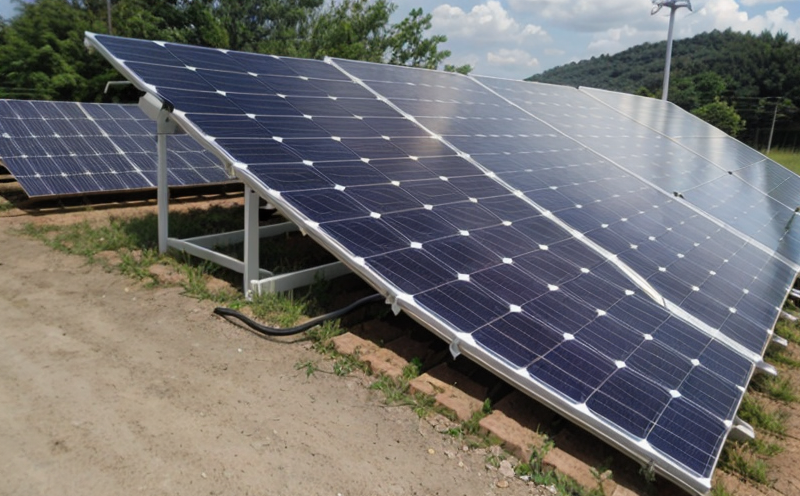IEC 61215-2 Thermal Cycling Extended Testing
The IEC 61215 series of standards provides a comprehensive framework for the performance testing and certification of photovoltaic (PV) modules, ensuring they meet stringent safety, efficiency, and durability requirements. Among these standards, IEC 61215-2 focuses specifically on the thermal cycling tests aimed at assessing the stress endurance of PV modules under fluctuating temperatures.
The testing procedure simulates real-world operational conditions where PV modules are subjected to rapid temperature changes. This includes exposure to extreme heat and cold cycles, which can help identify potential weaknesses or durability issues in materials used within the module. The extended thermal cycling test is particularly critical for ensuring that a solar panel will withstand the environmental stresses it may encounter throughout its expected lifespan.
The process involves subjecting PV modules to precise temperature profiles that mimic the weather patterns found in various geographical regions around the world. This includes periods of high heat, rapid cooling, and prolonged exposure to both direct sunlight and shade conditions. By replicating these environmental stresses, manufacturers can validate the reliability and longevity of their products.
During this testing process, it is essential that specimens are prepared correctly according to specified guidelines. Samples must be mounted on appropriate fixtures that replicate real-world installation methods while maintaining consistent temperature distribution across the surface area. Proper preconditioning ensures accurate results by allowing any initial stress or strain in the material to stabilize before subjecting them to thermal cycling.
The testing apparatus used typically consists of a climate chamber capable of precisely controlling both temperature and relative humidity levels within specified ranges. High-quality sensors monitor ambient conditions throughout the entire test duration, ensuring compliance with standard requirements. Data collected during these tests includes electrical performance metrics such as open circuit voltage (Voc), short-circuit current (Isc), fill factor (FF), and peak power output.
Acceptance criteria for successful completion of this extended thermal cycling test vary depending on the specific type and rating classification of the PV module being evaluated. Generally speaking, a module passes if there is no visible damage after exposure to defined temperature cycles; however, additional parameters like efficiency degradation rates may also be considered during evaluation.
- Competitive Advantage: Compliance with IEC 61215-2 demonstrates commitment to quality and reliability, giving manufacturers an edge in competitive markets by ensuring robust products that can endure harsh environmental conditions. This certification is particularly valuable when targeting international markets where stringent regulatory standards apply.
- Maintaining Market Share: By adhering strictly to these rigorous testing protocols, companies not only enhance their reputation but also protect themselves against potential recalls or product failures which could damage brand image and customer trust. Additionally, meeting such high standards can open doors for lucrative contracts with major players in the renewable energy sector.
- Enhanced Consumer Confidence: Consumers increasingly seek out sustainable solutions that are proven to perform consistently over time. By undergoing thorough testing according to recognized international standards like IEC 61215-2, manufacturers can build confidence among end-users regarding the long-term viability and effectiveness of their products.
- Innovation Opportunities: Engaging in advanced testing procedures such as extended thermal cycling encourages continuous improvement efforts within R&D departments. Insights gained from these tests can lead to innovations aimed at improving product performance, reducing costs, or expanding into new applications beyond traditional solar power generation.
Benefits
The benefits of undergoing IEC 61215-2 Thermal Cycling Extended Testing extend far beyond mere compliance with regulatory requirements; they encompass a range of advantages that contribute significantly to the overall success and sustainability of photovoltaic module manufacturing processes.
Enhanced Product Quality: By subjecting PV modules to controlled thermal cycling environments, manufacturers can identify potential weaknesses early in the production cycle. This proactive approach allows for corrective actions to be taken before large-scale issues arise, resulting in higher quality products that better meet customer expectations and industry standards.
Improved Efficiency: Advanced testing methods like those outlined in IEC 61215-2 help optimize the design of PV modules by providing valuable insights into how different materials behave under varying temperature conditions. This information enables manufacturers to refine their designs, potentially leading to improved energy conversion efficiency and lower manufacturing costs.
Cost Savings: Identifying defects early through rigorous testing can save significant amounts of money that would otherwise be spent on fixing faulty products post-production or dealing with warranty claims from dissatisfied customers. Furthermore, manufacturers who pass these stringent tests are often able to command premium pricing due to their reputation for quality and reliability.
Regulatory Compliance: In an increasingly regulated global marketplace, adhering to international standards such as IEC 61215-2 ensures that companies remain compliant with local and regional laws governing the sale of PV modules. This not only reduces the risk of legal penalties but also facilitates smoother operations across borders.
Increased Market Access: Meeting these high standards opens up opportunities for exporters to enter new markets where stringent quality controls are enforced. It also enhances brand recognition and trust among consumers, making it easier to penetrate established marketplaces and establish a strong foothold in the renewable energy sector.
Environmental and Sustainability Contributions
The implementation of IEC 61215-2 Thermal Cycling Extended Testing plays a crucial role not only in ensuring product quality but also contributes positively towards environmental sustainability goals. The rigorous testing process helps reduce waste by identifying defective products early on, thereby preventing them from reaching consumers where they might otherwise end up as landfill.
By enhancing the durability and longevity of PV modules through thorough thermal cycling tests, manufacturers can extend the operational life of solar panels significantly. This results in fewer replacements needed over time, which translates directly into reduced material consumption and energy usage associated with manufacturing new products.
The use of sustainable materials in PV module construction is another area where adherence to these testing standards contributes positively towards environmental sustainability efforts. Manufacturers who prioritize durability and reliability are more likely to choose environmentally friendly raw materials that have lower carbon footprints throughout their lifecycle, from extraction through disposal.





